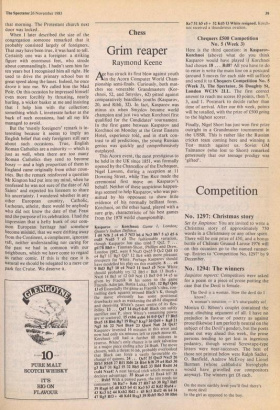Postscript
All Saints'
P.J. Kavanagh
?The otherwise admirable Miles Kington 1 came up with a rum radio programme to mark All Saints' Day and I have been pondering it, off and on, ever since. It was called Dem Bones and, poking fun at saints, came up with some good notions: St Louis, patron of the blues, for example, and St Helier, patron of tax exiles. What was odd, however, was his assump- tion that we all shared his wry amusement at the quaintness of it all, that things like All Saints' Day belonged to a well- forgotten past. In his trailer to the pro- gramme he confessed he wasn't even sure when All Saints' Day was and asked whether we, the listeners, were sure, as though he took it for granted we were not. In the programme he remarked that we didn't even appear to celebrate the day itself; he was often asked to Halloween par-
ties but never to All Saints' parties.
Well, it so happens that I went to Mass on All Saints' Day, and in case that gives a false impression of my piety let me dispel it at once. All Saints' is a Holy Day of Obliga- tion for Roman Catholics which means that they have to go to Mass on that day, if possible, or risk (so we were taught at school) hell fire: a notion I have never taken very seriously, not being a strict letter-of- the-law man, though I can see the point of a framework of such laws, human nature (my own included) being what it is. Anyway, on this particular All Saints' I wanted to go to church, for my own reasons, and so I did. It has never struck me as a bad idea to think sometimes, and formally, of the dead; of the ones we never knew as well as our own. (All Saints', incidentally, means all departed souls, not just saints canonised by the Vatican, as Mr Kington seemed to think.) At all events, I pushed open the door of a church 1 didn't know and, sur- prised by its colourfulness and warmth, I was astonished (to show that I am almost as much out of touch as Mr Kington) by the discovery that it was packed to the doors, at 9.30 on a weekday morning. The congregation' was largely women (which did not disrecommend it to me) but there were plenty of men, and it was of all ages. Nor did any of its members look as though they were there because they would cop it if they were not. So, All Saints' Day was being celebrated, behind Mr Kington's back. There were two Masses in the church
that morning. The Protestant church next door was locked.
When I later described the size of the congregation someone remarked that it probably consisted largely of foreigners. That may have been true, it was hard to tell. Certainly one was a foreigner: a striking figure with enormous feet, who strode about commandingly. I hadn't seen him for ten years but I recognised him all right. He used to drive the primary school bus at great speed along the lanes. Indeed, he once drove it into me. We called him the Mad Pole. On this occasion he impressed himself even more forcibly by thrusting, nearly hurling, a wicker basket at me and insisting that I help him with the collection; something which I, inveterate lurker at the back of such occasions, had all my life managed to avoid.
But the 'mostly foreigners' remark is in- teresting because it seems to imply an English belief that only foreigners still oare about such occasions. True, English Roman Catholics are a minority — which is just as well, when there are too many Roman Catholics they tend to become bossy — and a high proportion of them in England came originally from other coun- tries. But the remark reinforced a question Mr Kington had put into my mind, when he confessed he was not sure of the date of All Saints' and expected his listeners to share his uncertainty. I wondered whether in any other European country, Catholic, Lutheran, atheist, there would be anybody who did not know the date of that Feast and the purpose of its celebration. I had the Impression that a hefty hunk of our com- mon European heritage had somehow become mislaid, that we were drifting away from the Continent, a complacent, ignorant raft, neither understanding nor caring for the past we had in common with our neighbours, which we have come to regard as rather comic. If this is the case it is natural we should be relegated to a mere car Park for Cruise. We deserve it.















































 Previous page
Previous page